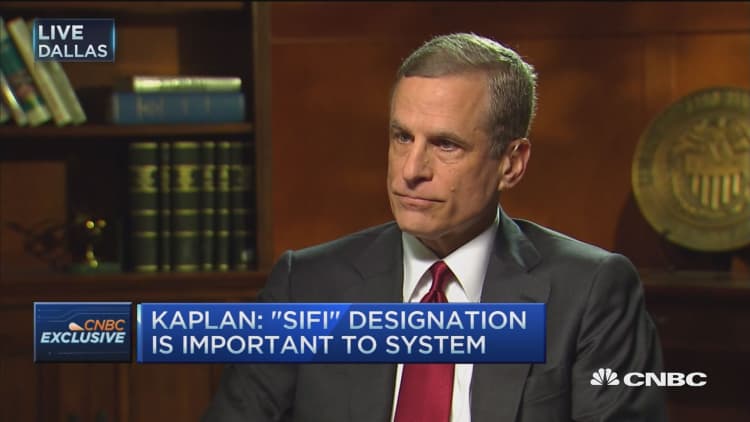
Mutual funds and exchange-traded funds should be required by regulators to set aside more money to make sure they can meet investor redemptions during times of turmoil, Dallas Federal Reserve President Rob Kaplan said Tuesday.
Sparked by concern over falling oil prices, the meltdown late last year in junk bonds, a significant percentage of which were energy-related, created a fund liquidity crunch that needs to be avoided in the future, Kaplan told CNBC's "Squawk Box" in a wide ranging interview.
Kaplan explained the problem.
"High-yield bonds today are held in mutual funds and ETF form, primarily," he said. "Those funds offer daily liquidity. So what happens when energy is weak, [funds] may not be able to sell ... energy bonds but [they're] going to sell every other bond in order to meet redemptions."
Last year, the iShares iBoxx $ High Yield Corporate Bond ETF (HYG), a reflection of the junk bond market, lost 11.6 percent, a sell-off that intensified in November and December, which sent investors scurrying for the exits.
Third Avenue's Focused Credit Fund became a casualty of the stampede, becoming the biggest mutual fund failure since the 2008 financial crisis.
The HYG continued to decline in early 2016, following stocks and oil lower until Feb. 11, when all three bottomed. Since then, the HYG bounced 7.5 percent, while the gained about 10 percent and oil prices surged nearly 50 percent.
But Kaplan remains concerned.
"I do worry about the instability that [a liquidity imbalance] creates," he said. "So I'd like to see … mutual funds have more liquidity because I think there's a mismatch between offering daily liquidity in a mutual fund or an ETF and the fact you really can't sell a high-yield bond, in some cases over many weeks."
Kaplan, who spent more than two decades at Goldman Sachs, said he's glad regulators are working new rules to address the problem.
The Dallas Fed chief also said the banks under his purview are weathering the oil collapse "reasonably well."
"There will be losses" on loans gone bad, Kaplan said. "I don't think this will be a systemic issue."



